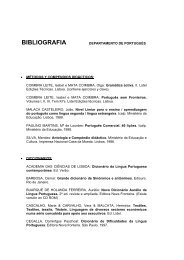Revista 25 aniversario - eoi de salamanca - Junta de Castilla y León
Revista 25 aniversario - eoi de salamanca - Junta de Castilla y León
Revista 25 aniversario - eoi de salamanca - Junta de Castilla y León
You also want an ePaper? Increase the reach of your titles
YUMPU automatically turns print PDFs into web optimized ePapers that Google loves.
¿Entien<strong>de</strong>s Europanto?*<br />
Toto et sa little sorella<br />
Die Mutter van Toto lui <strong>de</strong>man<strong>de</strong> to go shopping y le<br />
donne una liste <strong>de</strong> cosas zu kaufen. Seine Mamma le<br />
dice auch:<br />
- Bring la tua little sorella mit<br />
Toto geht zum magasin, kauft todas las cosas, aber<br />
quando er kommt zurück, seine little sorella tombe dans<br />
un Loch und disapear.<br />
Cuando Toto arrive at home, seine Mutti le dice:<br />
- Wo ist ta little sorella ?<br />
Toto answer:<br />
- Elle est dans un Loch gefallen.<br />
- Aber por qué du hast ella nicht help um zu sortir? dice<br />
la mother.<br />
- Porque no estaba escrito sur la liste! answer Toto.<br />
Der Mann col leone<br />
A policeman sieht pasar a einen Mann, qui se promène<br />
with un leone en laisse.<br />
- Eh, signor, stop!, says the policeman.<br />
Der Mann si ferma. The policeman says him:<br />
- No pue<strong>de</strong> vous promener so col leone. Sie müssen<br />
l'amener al zoológico!<br />
- D'accord, signor Policeman, answers le propriétaire<br />
<strong>de</strong>l leone, without to protest.<br />
Pero al dia suivant the policeman voit <strong>de</strong> nuevo pasar<br />
a <strong>de</strong>n gleichen Mann, che cammina <strong>de</strong> nouveau col<br />
leone.<br />
- Eh signor!, says the policemand böse. Qu'est-ce que<br />
do you faites col leone? Haben Sie ihn no al zoológico<br />
llevado?<br />
- Yes, signor Policeman, répond <strong>de</strong>r Besitzer <strong>de</strong>l leone.<br />
Siamo andati. Pero today, nous allons ins Kino. Kino<br />
es sa favourite distraction.<br />
*El europanto es una mezcla <strong>de</strong> lenguas europeas<br />
mayoritarias ”inventada” por un traductor <strong>de</strong> la Unión<br />
Europea, Diego Marani, que dice haberse inspirado en<br />
las mezclas <strong>de</strong> lenguas que ha escuchado en distintas<br />
playas <strong>de</strong> Europa...<br />
La administración <strong>de</strong> la Unión Europea (UE) agrupa<br />
a un número <strong>de</strong> funcionarios <strong>de</strong> nacionalida<strong>de</strong>s y<br />
lenguas diversas. Cada documento se traduce a las<br />
lenguas oficiales, y las cumbres, reuniones y consejos<br />
se hacen con la ayuda <strong>de</strong> numerosos equipos <strong>de</strong><br />
intérpretes. Sin embargo, en la urgencia <strong>de</strong> los<br />
encuentros en los pasillos o en la relajación <strong>de</strong> las<br />
entrevistas privadas, ha aparecido un habla sencilla,<br />
mezcla <strong>de</strong> todas las lenguas europeas: "europanto, esse<br />
very facile und mucho fun!"<br />
Una lengua sin reglas<br />
Es precisamente la ausencia <strong>de</strong> reglas la que dota <strong>de</strong><br />
encanto al europanto: ninguna gramática, ninguna<br />
directiva sintáctica, ninguna obligación en cuanto a la<br />
elección <strong>de</strong> vocabulario (<strong>de</strong> una lengua o <strong>de</strong> otra),<br />
ninguna <strong>de</strong>clinación, ninguna conjugación. ¡Qué<br />
liberación! Según una <strong>de</strong> las personas que lo hablan, el<br />
europanto se parece a lo que <strong>de</strong>bería ser la lengua<br />
original, previamente a la aparición <strong>de</strong> estructuras<br />
gramaticales opresivas: la <strong>de</strong> los primeros humanos<br />
mo<strong>de</strong>rnos o la <strong>de</strong> los bebés europeos. Cada individuo la<br />
compone con sus propios recursos lingüísticos<br />
(internacionales). En el instituto, ¿quién no ha mezclado<br />
varias lenguas al hablar en alemán o en español? Se<br />
empieza por un error, que <strong>de</strong>spués se convierte en un<br />
juego al darnos cuenta <strong>de</strong> que el otro nos entien<strong>de</strong> y a la<br />
vez se mantiene la espontaneidad <strong>de</strong> la lengua.<br />
Si tuviéramos que citar una única regla <strong>de</strong> formación<br />
<strong>de</strong>l europanto, esta regla fundamental sería: expresarse<br />
y compren<strong>de</strong>r. En principio el europanto pue<strong>de</strong> estar<br />
constituido por un número infinito <strong>de</strong> lenguas. Como su<br />
nombre indica, esta lengua es principalmente<br />
eurocéntrica: el alemán, el inglés, el francés, el español<br />
y el italiano.......<br />
Teresa Vicente Corre<strong>de</strong>ra y Vega Llorente Pinto<br />
Profesoras <strong>de</strong> Francés y Español en la EOI<br />
Sorry, I do not speak English<br />
A few days ago, the Spanish Presi<strong>de</strong>nt, J.L.R.<br />
Zapatero, said that within ten years 90% of the Spanish<br />
population would speak English. I was thinking about<br />
this electoral promise and so I thought of a question:<br />
why do Spanish people have so many problems when<br />
learning English? I do not know the answer to this<br />
question, but this fact makes me have some doubts<br />
about the Spanish education system. Nowadays, in<br />
Spain, a child starts to learn English when he is three<br />
years old, and continues studying English until he is<br />
sixteen or eighteen years old. So, I do not un<strong>de</strong>rstand<br />
why Spanish people cannot speak English.<br />
It is known that a person learns a language when he or<br />
she practises it, and I think that a feeling of shame is<br />
common in the character of Spanish people when we<br />
have to practise a language which we are learning. We<br />
are scared if we have to speak in class in English. If we<br />
are walking towards the city centre and an English<br />
person ask us something in English, although we<br />
un<strong>de</strong>rstand them, we answer in Spanish because we are<br />
scared about looking stupid. We do not make the most<br />
of the opportunity to practise our English. There are a lot<br />
of ways of improving the language we are learning, for<br />
instance summer courses or scholarships. There are also<br />
pubs or other places where you can talk in English to a<br />
native person (also in the E.O.I.).<br />
In conclusion,I believe that there are two factors<br />
which make it difficult for Spanish people to learn<br />
English or any other language: embarrassment and<br />
laziness.<br />
Mª <strong>de</strong>l Mar Fuentes, 2ºE NBInglés





